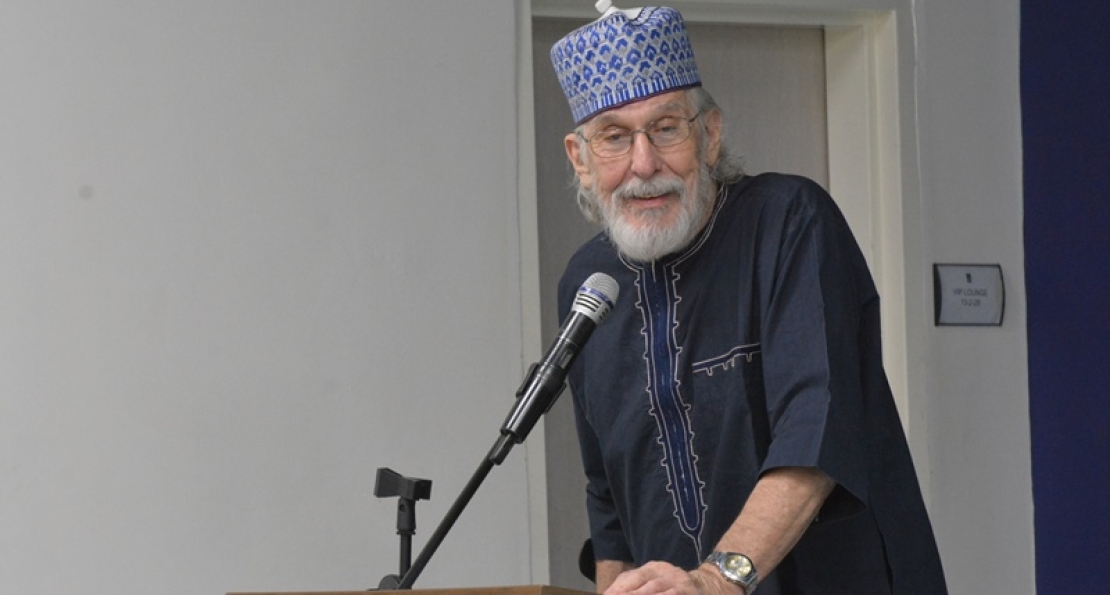Is Affirmative Action 'fair and just' to the excluded? Do we have a moral duty to disobey an unjust, discriminatory and prejudicial law, a law which empowers one section of humanity at the detriment of another, or which consigns a section, whether minority or majority, to a life of misery, inferiority, and degradation?
Professor William Bill Hansen, who teaches Politics and International Studies, opened with a scathing critique of governments that avow to latitudes of freedom in state constitutions but zealously prevent citizens from accessing the same freedoms in real life.
Take hate speech and anti-gay legislation for example. Professor Hansen questions the paranoid Nigerian Government officials have developed for what they term Hate Speech and the several attempts to legislate against it. The 1999 Nigerian Constitution guarantees freedom of speech for all, he noted, asking, rhetorically, whether the Nigerian Government's obsession with hate speech, defined by whatever parameters, is not an overenthusiastic violation of people's rights as guaranteed by the Constitution.
"All governments allow the citizen to agree with the government. It's when one disagrees that freedom of speech comes under attack. The fundamental problem is who gets to define "hate speech". The definition often becomes what a government or an individual does not want to hear. The whole point of "free speech" is that its exercise is saying what a government or an individual does not want to hear."
Same as Gay rights. The Nigerian Constitution also guarantees citizens' freedom of association but Professor Hansen strongly questioned the enactment of the anti-gay law which prescribes a 14-year jail term for anyone convicted of homosexuality by the same Nigerian Government. It is a fact that several persons have been arrested and charged to court on allegations of homosexuality in Nigeria.
"Morally speaking, it is not the government's role, nor my role, nor any individual's role, to tell another human being whom s/he can love and sleep with. In 1963 the US State of Arkansas tried to tell me and the woman I loved that we could neither love each other nor marry nor live together because she was African American and I was White. My wife and I simply defied the law and dared them to arrest us. They backed down."
The Anti-Gay Bill was signed into law in 2015 by former President Goodluck Jonathan but has not been reviewed, challenged or upturned by President Muhammadu Buhari, who came to power in May 2015. "It is easy to say 'I am opposed to Discrimination' but people support those views and positions which favor them".
Professor Hansen was however more sympathetic to the practice of Affirmative Action, especially where deliberate national or institutional policy is created to favor women, girls, physically-challenged persons and the weaker segments of the community. While he accepts that ultimately, Affirmative Action is some form of discrimination to the extent that it holds back some sections of qualified applicants to a job, college admission or socioeconomic and political advancement, it is, however, a 'necessary evil' to achieve inclusiveness and social progress.
To the question 'is there more or less discrimination at the global level', Professor Bill Hansen drew a breath and trained a disapproving gaze. Nothing has changed, he noted. Quoting from one of his favorite philosopher-activists, Frederick Douglass, the escaped slave, American Abolitionist and gifted writer, who wrote that 'Power concedes nothing without a demand; It never did and it never will', Professor Hansen observed that power and powerlessness exist within a context and are neither Absolute nor Eternal.
"Blacks suffer discrimination in the United States but Nigeria is run by blacks". People who have power will, if unchecked, abuse it, he said, but noted that power used responsibly creates social cohesion, diversity, and progress.
A revolutionary intellectual-activist, Professor Bill Hansen has published globally acclaimed research on Boko Haram and the Insurgency in Nigeria's Northeast region. In Boko Haram: Religious Radicalism and Insurrection in Northern Nigeria (2015), published in the Journal of African and Asian Studies, he employs African-French writer Franz Fanon's radical political economy framework to discuss Boko Haram's historical mutations and ideological variations connected to the socioeconomic deprivations of Nigeria's underprivileged classes.
In Poverty and "Economic Deprivation Theory": Street Children, Qur'anic Schools/almajirai and the Dispossessed as a Source of Recruitment for Boko Haram and other Religious, Political and Criminal Groups in Northern Nigeria, Professor Hansen argues that the criminal expropriation of the masses by the 'parasitic predator class' of Nigeria's post-colonial rulers is the root cause of the insurgency and associated criminality in Northern Nigeria.


